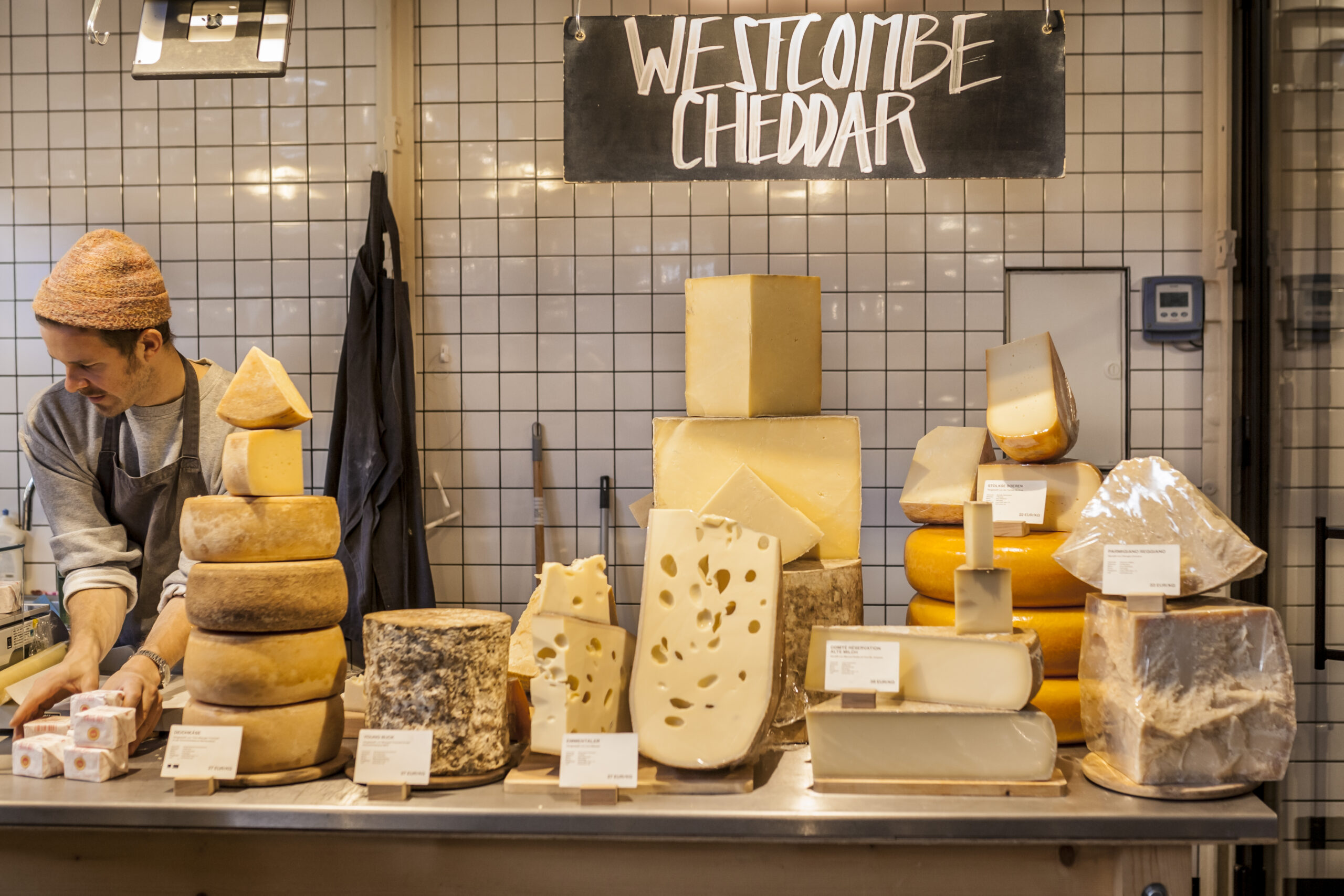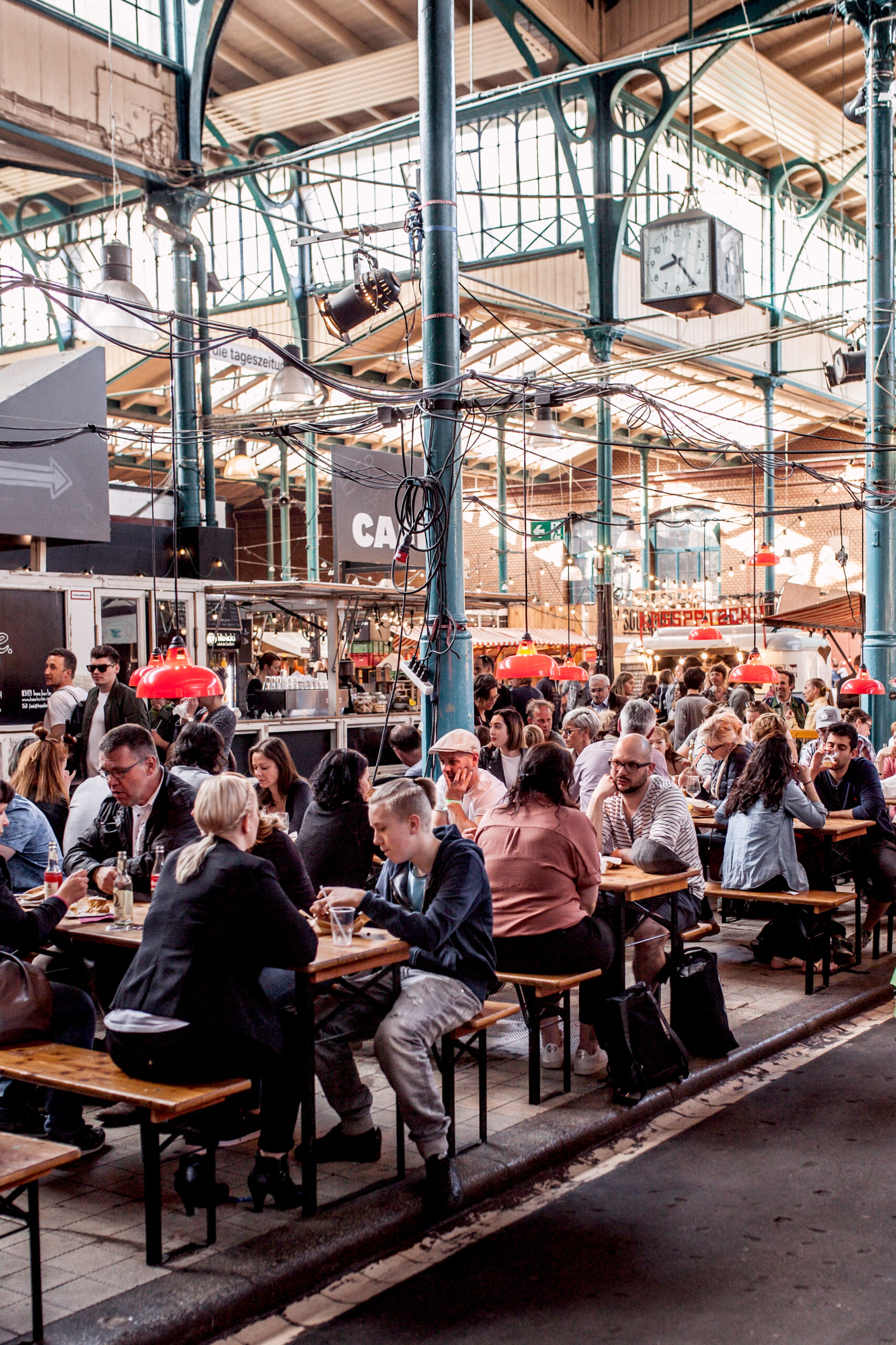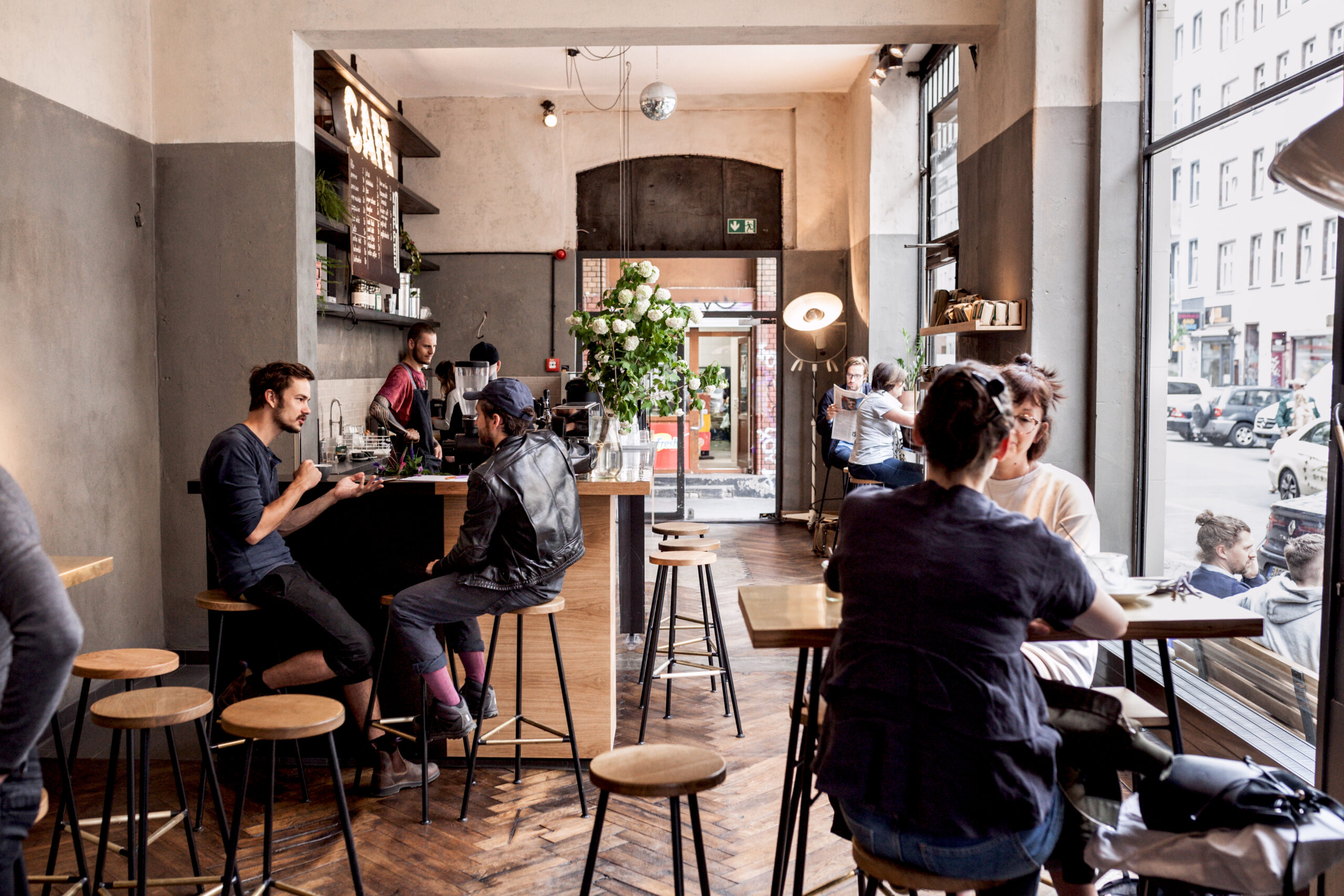Markthalle Neun

A conversation with Lea Ligat from Markthalle Neun in Berlin-Kreuzberg about the development of the market hall, its educational mission, and the collaboration of all actors in the food system.
Today, Markthalle Neun is one of the few remaining historic market halls in Berlin that was reopened a few years ago with a new concept. Can you briefly explain how this reopening came about?
The Markthalle Neun has existed for a very long time, it was inaugurated in 1891 and was one of a totals of 14 in Berlin. After the announcement of the Senate’s privatization plans, citizens’ initiatives lobbied hard to ensure that the hall did not change hands to large investors – there were plenty of interested parties – but instead fulfilled its actual purpose again and provided a market for everyday necessities as well as a meeting place for the neighborhood. Instead of simply selling it to the highest bidder, there was a conceptual process that determined the best and most suitable idea. The aim of the Markthalle Neun concept was to show how eating and shopping differently is possible for everyone. In 2011, it was reopened as Markthalle Neun by the current operators.
What was the condition of the Hallo before it was taken over by the new operators?
This place was really derelict, it was really crazy. Since the seventies, three big discounters dominated the market hall, one is still here. They took up about three quarters of the space and there were almost no other, smaller stalls left at that time. At that time, the city tried to bring together under one roof everything that was needed by the residents on a daily basis – in a way, we are doing that again today and offer a wide basic assortment, but nowadays with a different focus than back then. In the 2000s, the hall almost died out, but fortunately it could be redesigned quite quickly after the takeover, because many people found their way to it really quickly. Starting with Johannes Heidenpeter, who has been brewing craft beer here since the beginning, to Sironi, who opened one of the first glass bakeries in the hall.
Catchword Glass Bakery: So, the market hall is not just a place to shop, but rather a place to experience food craftsmanship, isn’t it?
At the end of the day, that is exactly what we are about – being a platform for food crafts and regional value chains, while at the same time the Markthalle offers us the space to explore how a food revolution can work, how Berlin can feed itself in the future. We can explore different topics and questions here and try things out, even with the knowledge that we will not find an immediate solution to everything. The Markthalle offers a platform with very different formats to all people who want to deal with the topic.
What formats are these exactly?
On the one hand, there is the weekly market, which, even in Corona times, brings together a large number of regional farmers and traders who can sell their products here. The focus is on the Berlin-Brandenburg region, but at the same time there are also regional products and specialities from all over the world to represent Berlin’s culinary diversity. In order to be able to show all this diversity, we launched Street Food Thursday in 2013, which offers young chefs from all over the world a stage – especially for those who have just come to Berlin and have not yet established a foothold, this event series offers a good opportunity to show their food culture to a larger audience without taking a financial risk.
We also organise various themed markets, each of which is dedicated in detail to one food craft. We bring consumers close to producers, which creates a strong network and promotes direct exchange. We see this as our educational mission, which does not need to be pointed at, but simply works through tasting, experiencing, and getting to know. We want to inspire people to look at how they can eat differently.
What is your goal with this?
We are committed to ensuring that there is good food here for everyone, that is our big goal. For us, this means that food is not only good for the consumer, in other words, it tastes good and offers sufficient nutrients, but also has a positive effect on the entire value chain – traders, farmers in the fields and everyone else involved in production must be able to profit from it in the long term. However, this also means that the food is often a bit more expensive than, for example, what is on offer in the discounter, which a broader mass of society can afford. Our basic concern is therefore to show that food is incredibly political and that when we talk about a change in nutrition and agriculture, we are also clearly talking about the fact that something has to change politically so that good food is not something elitist but really accessible to everyone.
How could this be done?
This is not only due to the price of food, but also because the education system in Germany does not provide anything at all on the topics of nutrition and cooking. If you grow up in a family where cooking does not play a role, where food is not dealt with, this often means that you simply have no relationship to it, because this is not taught at school either. You do not know how to handle food, what you can do with it. This is exactly why we have been offering nutrition education in various forms since 2014 – knowledge exchange, dialogue with experts and food artisans, as well as cooking classes and workshops. In particular, we want to greatly expand the educational programme for children. Since summer 2020, we have had our cooking school Neun, for which we work together with schools from the neighbourhood and various social associations to bring children closer to food – this goes beyond pure cooking and sees itself more as a kind of adventure tour.
It is very important to make the children enjoy it, to create a connection, to show diversity. By putting this into practice, we empower them to make their own (purchasing) decisions later on and to be more sustainable with them. Just as we feel responsible and act, politics must also react. Only with a radical change in policy can we achieve a food and agricultural turnaround.
“Our basic concern is to show that food is incredibly political and when we talk about a food and agricultural turnaround, we also talk quite clearly about the fact that something has to change politically so that good food is not something elitist, but really accessible to everyone.”
What does it mean for you and your work to be part of the community?
Since we are pulling in the same direction as the community and share the same values, it was clear to us that we wanted to be a member. Die Gemeinschaft (the community) is committed to the expansion of the network and the exchange of all actors, which is exactly what we also want to promote. Because we can only make change possible by sticking together. Unfortunately, people often stand in each other’s way, even though they are pursuing the same goals. Too often there is a lack of communication and understanding for each other – which I believe is because we do not listen and share enough with each other.
Die Gemeinschaft brings an incredible amount of communication into the gap between city and countryside, so really where it is needed. Our big goal is the food turnaround in the city with a simultaneous agricultural turnaround in the countryside – they absolutely belong together, because without one the other does not work at all. The community brings all the actors involved to the table.
How can the cooperation of all actors be further strengthened?
Part of a strong cooperation is definitely constant exchange and cooperation, but it is also part of it to show very concrete proposals for solutions. It needs good examples, which in turn inspire others. At the Markthalle, we have made it our task to give people and projects a stage that otherwise would not have one. And that is also the beauty of the community, for example, that it constantly draws the attention of the gastronomy to the interests and needs of agriculture and vice versa.
What do you see as the most important core issues that need to continue to be worked on in the food system?
What I think is more important than anything else is that we need to understand much better how complex the food world is, including agriculture and gastronomy. We need to understand how much food connects different areas of our lives and our economy and give it more emphasis. There is definitely a lack of a lobby for these issues. The food system is not valued enough, this is the case in all areas, and it is imperative to change this, both on the part of politics and on the part of each individual. Since the big political structures usually take a long time to get things done, it is even more important that we make a big difference on a small scale and build up pressure from below.
Photos
Markthalle Neun




